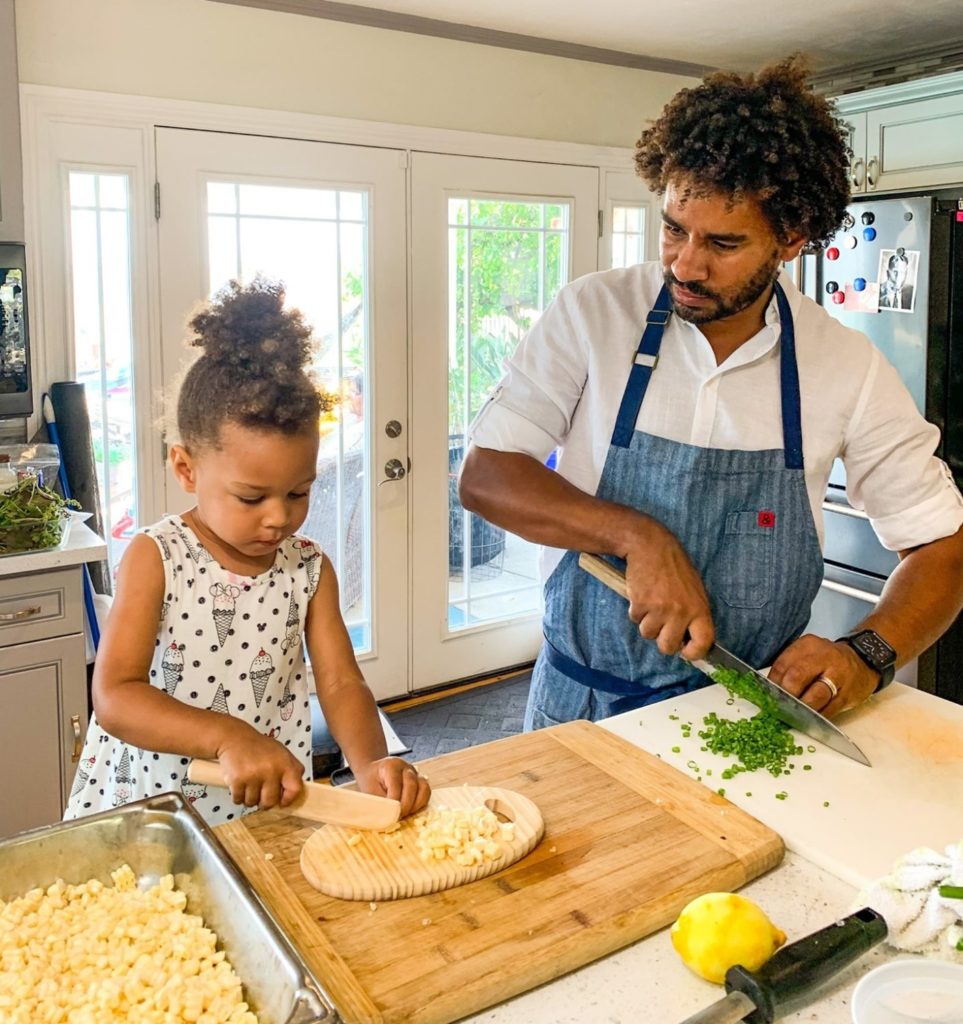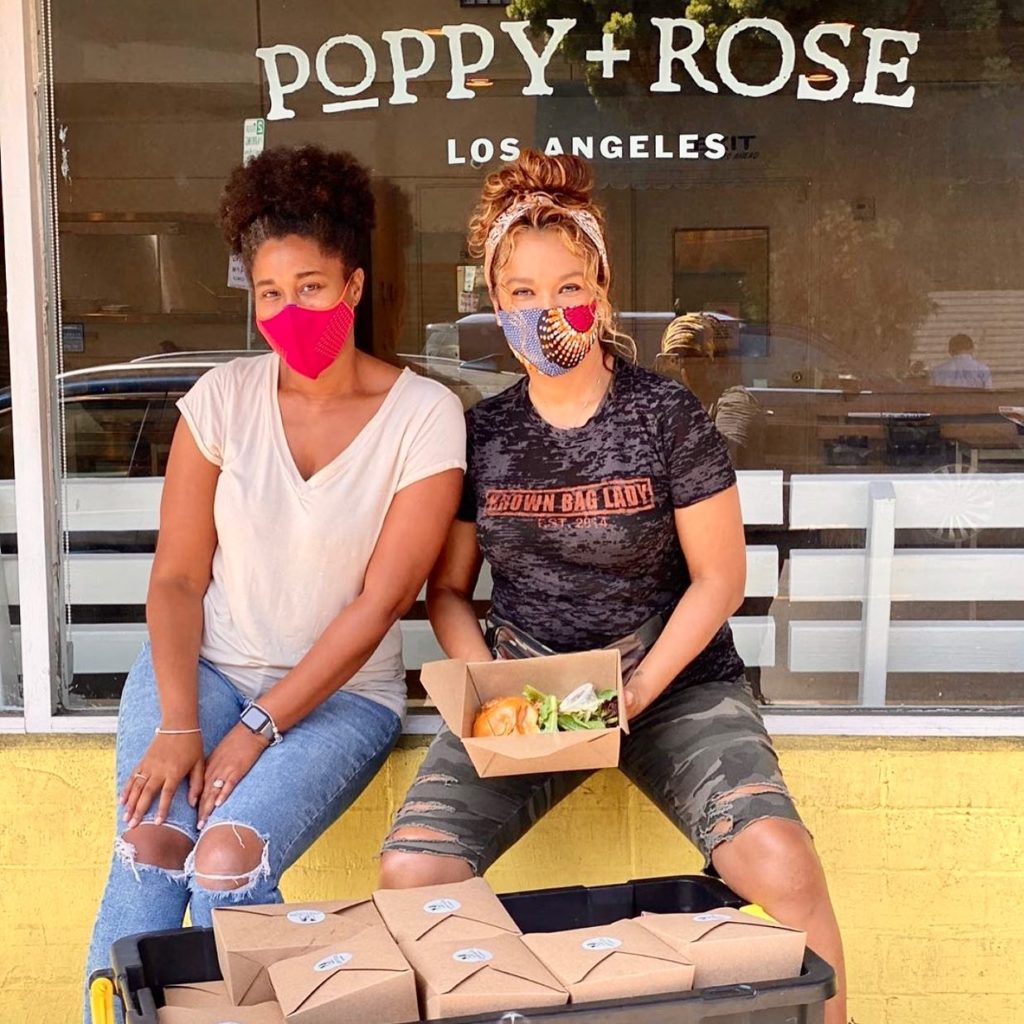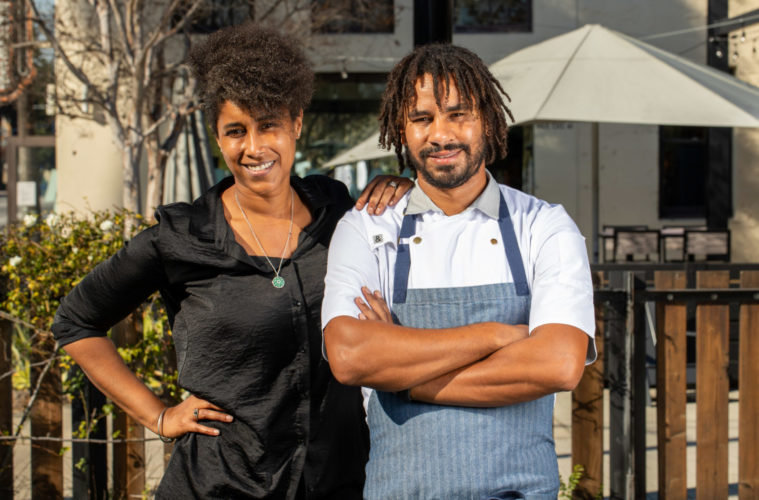When Michael and Kwini Reed opened Poppy + Rose inside the Los Angeles Flower Market in 2014 near Skid Row, there wasn’t a single bank that wanted to take a chance on them. Lenders all told them the restaurant business was just too high risk, even though they were approving loans on others.
Michael already had a thriving catering business, so they scrimped and saved every penny from each catering event. He did all the renovations himself – the tilework, the bar, the bookshelves and the lighting behind the bar. The only thing he left to the professionals was the stove hood. After cooking all day and working events in the evening, he’d come back for five hours and work on the restaurant, putting a ceiling up and spray-painting countertops.
“We didn’t really have a budget in the beginning,” the Culinary Institute of America graduate tells L.A. Weekly. “We couldn’t get a bank to give us a traditional loan at the time because they looked at restaurants as high risk – especially a Black-owned restaurant, even though I had business partners.”

Poppy + Seed brunch (Marika Adamopoulos)
The fully owned and run family business got off its feet with the financial help of friends and family, and pure sweat equity. Since then they have opened the beautiful Poppy + Seed garden restaurant in Anaheim and are preparing to expand further with Poppy + Rose West Harbor in San Pedro, which also will have a large garden to bolster the kitchen and will offer dinner and elevated grab-and-go items.
“It helps keep generational wealth within the family. Even with the new property, if we fall short and need to raise a little bit more money, the only people we are going to are our family. We come from a family where our brothers and sisters have good jobs, and capital. I’d rather have them invest in us with a sure brand that is moving forward. We know how to run our company. I would rather just keep it all in the family, and have them see the returns and build their portfolios rather than some bank.”
That sense of community runs very deep in the Reed family. As Kwini puts it, to whom much is given, much is required. At Poppy + Rose, the staff hands out anywhere from 20 to 30 free meals everyday, as well as larger giveaways where they activate at least 100 meals. They currently have started the same practice at the new Poppy + Seed in Anaheim.

Family business – Michael + McKenzie Reed (Courtesy Poppy + Rose)
At the start of the pandemic in March of 2020 – even during the shutdown while the restaurant was closed – the husband and wife team used their positions as restaurateurs to bring hope to thousands of people throughout Southern California, through a charity they created called the UNI Coalition (as in YOU and I). They’ve helped get homeless and formerly incarcerated Angelenos off the streets by giving them the opportunity to start careers in the kitchen at Poppy + Rose. They’ve raised funds to get homeless neighbors into rehabilitation facilities, and they’ve worked to donate over 3,500 meals, 150 coats and blankets and 1,500 water bottles (in partnership with Mountain Valley Spring Water) to those living on Skid Row. At Christmas they gave more than $5,500 away to people who directly messaged them on Instagram regarding unpayable medical bills, student debt and more.
But of all the obstacles along the way, staff challenges and rising prices post-pandemic have hit the hardest.
“The toughest thing about keeping the business running right now is staffing and being able to compete in the industry that is just throwing money at the situation and taking advantage of the shortness in staff,” Michael says. “It’s getting brutal out there. Employees are coming to me, telling me they’re getting calls from bigger hospitality companies offering disgusting amounts of money for positions that we can’t keep up with. We’re not a Hyatt or a large conglomerate, we’re a small business. Another big challenge right now is managing the customer’s expectations. Prices are increasing, wages are increasing and the customer still doesn’t understand that if things are increasing for us, things are going to increase for you. We feel that sometimes we get the short end of the stick because we are Black owned, people expect more from us. People expect for us to constantly always be present, always in a good mood. I don’t think we get the same amount of grace when we do have a shortfall and are struggling in an area like staffing and things that are out of our control. I don’t think that barrier is there for minorities and Black business owners.

Kwini and the Brown Bag Lady feeding the neighborhood (Courtesy Poppy + Rose)
According to Kwini, employees are getting poached right under their noses, cold calling asking for referrals and trying to lure good employees away.
“They are offering $20,000 to $30,000 over salary or $10 or $15 over hourly, so they’re offering dishwashers $25 an hour, line cooks $27 an hour,” she says. “The big hospitality chains are doing it all over LA. They’re slowly taking out the small companies like ours, so we have to rely on our relationships with our employees; hopefully they see that we’ve been good to them and stay.”
“But we really believe that the goodness we put out in the world will come back to us,” says Kwini. “As long as we’re staying positive, we’re just running our own race. Whatever that looks like and whatever obstacles are put in front of us, we’re just running our race. It doesn’t matter what’s happening around us, if things are rising or falling, employees are leaving or staying, I just know that because of the foundation and seeds we have planted and who we are as people, we’re going to be OK.”
Advertising disclosure: We may receive compensation for some of the links in our stories. Thank you for supporting LA Weekly and our advertisers.

